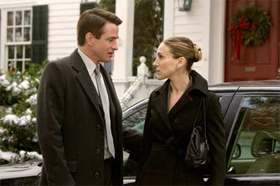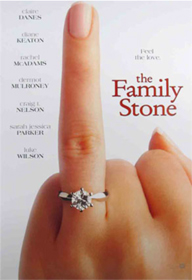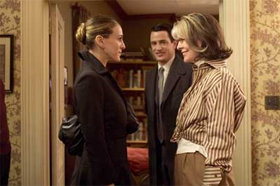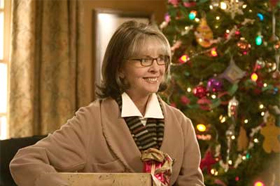The Family Stone interview with Sarah Jessica Parker & Diane Keaton Interview

by Paul Fischer in Los Angeles
SARAH JESSICA PARKER AND DIANE KEATON: LOVE, DEATH AND SEX
Sarah Jessica Parker may have risen to stardom as one Carrie Bradshaw in the award-winning Sex and the City, but the actress proves her versatility as an unsympathetic character in the ensemble comedy The Family Stone. Funny and consistently surprising, Parker, wearing a pink shirt dress, a cameo buckle on her belt, and wavy hair, talks life after Sex, along with her formidable Oscar winning co-star, the legendary Diane Keaton, with Paul Fischer.
Some audiences will undoubtedly leave the theatre not liking your character, compared to "Sex & the City's" Carrie. So what is the legacy of that TV show?
Sarah Jessica Parker: I love that we live in a country where people can have different opinions like it's so hard to feel alone. I think it's wonderful. It's cool. I would say I'm not burdened by this legacy of "Sex & the City" or Carrie Bradshaw. I'm happy to have to work hard as an actor to remind people that I was a working actor before that show, and that this wonderful thing happened, and I'm thrilled to be part of something that people connected to, women especially. And I've never thought about those things in my past. I think it wouldn't serve me to do so now. I think it's incumbent upon me to try to be smart and make good choices and work with good people and work my ass off when I'm working with good people and I have to let everyone have their opinion afterwards. But this is what happens. You make a movie or you're on a show and then you have this experience and everyone tells you what you did. They tell you what you did. That's allowed. That's the experience of being human and subjectivity. That's it. We can only do what we'll do, and I can only do the best I can do.
Paul Fischer:: Was part of the reason for playing this character is to be far removed from Carrie Bradshaw?
.Sarah Jessica Parker: Yeah, but not arbitrarily. I wasn't just saying, "Among you, who are different ..." It was this part in this film that was, this person that was so radically different from Carrie Bradshaw, and frankly unfamiliar to me as a person. I've never met anybody like Meredith, but it was also the fact that she was also this beautiful -- I love the way that she was written, but larger piece was equally important. It's fine to have a great part, but not so fine to have a great part in a mediocre script. This was a double whammy in a great way. This was a great part in a great script, with great people, and those opportunities, I don't think, in my experience, always come together.
Paul Fischer::How do you prepare for a character like that, that you have no identification with? Your Imagination?
Sarah Jessica Parker: You draw on imagination, but I have this beautiful script that was so clear to me who she was. The same way you tel any story, whether someone is familiar or not. I've played lots of people who I didn't know: mothers with many children who found themselves in terrible situations. Or lots of circumstances that are unfamiliar, but if you don't have training and don't have a method, the most helpful thing for me to do is simply tell the story as you understand it and hope you have a great director. In our case, we had an extraordinarily gifted director.
Paul Fischer::Diane, you were the first person signed up for this?
Diane Keaton: Apparently. So they say, but it's not true. No, she was (points to Sarah JP). Because you know how long this movie's been around? Forever. It's been like.....forever.
Sarah Jessica Parker: But you were the official first. (they talk over each other a bit here, hard to hear)
Diane Keaton: I guess it was officially me, but she read it first and loved it. And they couldn't quite get it on for some unknown reason. And then when I signed on, then they gathered together everybody, because then they pretended like they had a movie, but they didn't until they got everybody else. My belief about that whole thing is that when people hand you scripts and go, "Oh, so and so is attached." Then that means that you're an actor, "Oh yeah, so and so is attached, so I better read it." That's all it gets you, is the reading. And I think that that's what they had. They laid it on her again, and then she said yes, which is fantastic because I remember when they were talking about that. Frankly, I never thought the movie was going to get on. I thought, "Yeah, right. I've been down this road a few times." Every time I would, Tom would say, "No, it's going to happen." I'd say, "Are you sure, Tom?"
Sarah Jessica Parker: Well, you know what happened? The reason I think he felt so confident was that Michael London came along. All of a sudden the whole thing was elevated, and then Diane came along, and it got very real ...
Diane Keaton:Yeah, Michael London is a big, huge --
Sarah Jessica Parker: He's one of the heroic, less remembered parts of this story, I think, because before he was part of the movie they just kept having these false starts.
Diane Keaton: This is completely true, and enough isn't said about producers who are really good at the job. Michael London's an excellent producer.
 Paul Fischer::Diane, you didn't treat Sarah well?
Paul Fischer::Diane, you didn't treat Sarah well?
Diane Keaton: I wasn't kind.
Paul Fischer::You didn't tell anybody that you were going to do this to the poor girl, so why ...
Sarah Jessica Parker: Why pretend now? Wouldn't it be a better story if we wouldn't be in the same room together even? I'm so damaged.
Diane Keaton: I'm an Irish Catholic. And you know what that means. Teasing is the best thing in my life. My father used to torture me with teasing, and now I'm carrying the legacy on. My whole life, the greatest pleasure I ever had was constantly repeating it over and over, to my delight and nobody else's, that she's the bitch from Bedford. I told them they should title the movie "The Bitch from Bedford." Nobody listens to me ever! I was "Trust me, Tom. It's 'The Bitch from Bedford.'"
Sarah Jessica Parker: It used to be called "Hating Her."
Diane Keaton: It was.
Sarah Jessica Parker: It used to be called "Hating Her," actually, before that, it was "F-ing Hating Her." Do you remember that?
Diane Keaton: "Fucking Hating Her"?
Sarah Jessica Parker: Exactly.
Diane Keaton: No, I didn't know that. I thought that ... but this was my greatest joy of the whole entire movie. Plus she had to room with me. We were roommates. By that I mean we were in the makeup trailer every morning at five.
Sarah Jessica Parker: No, let them take from that what they thought. You just corrected yourself. We were lovers. The tension was so intense that I thought the best way to solve this problem was to make love. (laughter)
Paul Fischer::How was that then?
Diane Keaton: Special. Very special. I'm a special needs lover!
Paul Fischer::You'd think you'd know better than that to have the press have a quote like that.
Sarah Jessica Parker: There are so many worse things that I could say that aren't true that are just provocative.
Diane Keaton: I would be honored, frankly. (laughter)
Paul Fischer::In great dinner scene ...
Diane Keaton: Oh thank you for saying something nice. I love you. I worship at your feet. Wasn't it a good scene though?
Paul Fischer::Every gay man in American will want you as their mother...
Diane Keaton: Good. I'm ready. They can have me. I'll be happy to be their mother. I don't know what to say, but could there have been a better gay couple in the world? Were gay people better represented by those two actors? They were so moving. Ty and Brian -- Ah! I love them so much, and their baby at the end -- Oh! I mean, life goes on, and that baby's in great hands.
 Paul Fischer::Diane, did you tell the cast that you were going to do this to Sarah?
Paul Fischer::Diane, did you tell the cast that you were going to do this to Sarah?
Diane Keaton:Oh yes. No, it was a formal -- I'm just teasing. I'm kidding.
Sarah Jessica Parker: I was -- and I'm not just saying this for your sake, that if there was some sort of documentation, I'd be perfectly willing to show you. I kind of felt privileged to be on the receiving end of this snarky, funny, kind of cruelty, but not really. You know, teasing. I was actually, "Oh, that's a shame. She doesn't like me." No seriously, because I a few years ago, that would have been me sobbing in a room. Seriously. That that is the wisdom of the ages. Simply going on and saying, "This is the way she needs to work. I don't have a process that I'm going to impose on her, but I'm perfectly happy to make her feel comfortable." Whatever works for her. And I went home and I told people -- not people, but my family who were concerned about me -- I'm like, "It's okay. It's actually okay." Honestly, because it was funny. It was like, "Oh, she's going to do that to me. Alright."
Diane Keaton: Come on. Give me a break. It's a form of love. It's my idea of affection. No? No, I'm not getting anybody?
Sarah Jessica Parker: It wasn't cruel. Like I said, it was kind of I felt like, "Wow. She thinks I" -- that's what this idea that she has that it's a form of affection. It's not unfamiliar. I have brothers. I have a husband. It's fun to make fun. It's fun to poke fun. You have to have an implicit understanding that this is what it is. It's swordplay.
Diane Keaton: Yeah.
Paul Fischer::Does this help you be empathetic towards this character?
Diane Keaton: Oh yeah. That's interesting.
Sarah Jessica Parker: I assumed that that was her point. I thought that that had something to do with it, and it was valuable to know what it felt like to not be warmly embraced like Diane Keaton.
Paul Fischer::Isn't this a traditional thing in film, like Westerns, where the actors playing good and bad guys stay separate?
Diane Keaton: ... circle around each other, yeah. Well, first of all I've never... yeah, I agree.
Sarah Jessica Parker: But sadly she wasn't afforded the opportunity to really complete it. Like, it was an unfinished, the circle was not complete because she did, we did spend -- we were put in a trailer by ourselves the two of us for hair and makeup, which is pretty intimate experience.
Diane Keaton: Yeah, it really is.
Sarah Jessica Parker: And so by that time, I basically, I don't know. I felt like I was forced on you and then I don't know. I feel like there's so much that we love talking about. We could talk non-stop easily about everything in the world. And Diane is interested in everything in the world.
Diane Keaton: We want a morning talk show.
 Paul Fischer::If the internet is any indication, you're going to have a milestone birthday coming up in a couple of months.
Paul Fischer::If the internet is any indication, you're going to have a milestone birthday coming up in a couple of months.
Diane Keaton: I am. I am going to have a milestone birthday...
(Laughter)
Diane Keaton: I'm going to be 60 - yeah.
Paul Fischer::I'm curious how you, you know, how you feel about that - if you're looking forward to it...
Diane Keaton: You know, I feel in a very... you know, it's so strange because those birthdays - I remember at 30, when I was 30, that it was devastating. It was a hideous nightmare. I was forgotten by my loved ones. My sister, Robin - Robin wherever you are -
(Laughter)
Diane Keaton: She let me down. She forgot about my birthday. I completely collapsed. I was just... and ever since that 30th birthday, the debacle, the ruination of my whole emotional life, it's been getting better.
(Laughter)
Diane Keaton: And every fucking decade I feel just a little bit more secure. I mean I think that that's nice but the... the one thing about turning 60 is that I'm completely consumed by time now because I realise that I'm 60. So it's all about time - so time is so darn precious. So I just want to do every single possible thing I possibly can in every way. I wanna, you know...
Paul Fischer::Like what?
Diane Keaton: Cherish my kids more. I want to like experience the school experience but at the same time, you know, I wanna make sure that I read the paper - and, oh, did you read the Joan Didion thing and then, ohblablablah - and you didn't see Monument Valley and are you going to go... you know, it's so damn exciting. I mean the point about life is that as you go along it gets more and more and more and more and more compelling, interesting, dramatic, touching, tragic, you know, moving, exciting, lovely, divine, light - the play of light on a window - da, da, da, da - and on and on. And so I really feel that it's, um... it just makes you savour life more and more as you... as you go along. So... but, but in terms of my specific 'what am I going to do on my 60th birthday'... I'm terrified that I don't know what to do. I've started thinking maybe I'll go to Monument Valley or do something like really interesting - go see the west - because I loved when you mentioned the west, I am consumed by the west and I, you know, I love westerns and I love John Ford - I mean I love America and the west and...
Paul Fischer::When you talk about time being precious, I mean, now talk about playing this character who's going through dealing with her mortality and...
Diane Keaton: I gotta tell you, look, I gotta tell ya. When I saw the movie the first time and I saw that picture - that they cut to that picture at the end, you know, they pan over to that picture of me when I was 27 - that picture was taken by my mother.
Paul Fischer::Wow.
Diane Keaton: I can't stand it. And, you know, that moved me more than anything in the movie because that picture was to me about my mother and that I felt... I had the strangest feeling when I looked at that picture - which I hate that picture -
(Laughter)
Diane Keaton: But I had this feeling that, you know, that's the best acting I've ever done in my whole entire life is that portrait that my mother took. So the whole thing about motherhood and, you know, your sense of honour to your mother had such resonance for me in that moment, and I just thought that Tom Bezucha captured that in such a lovely way about, you know, life going on and... and for me personally my mom took the picture, I'll never forget that. It's my favourite moment in any movie that I've ever been in is my mother's photograph of me because she took it.
Paul Fischer::Family sounds very important to you.
Diane Keaton: Oh! I love my mother - forget it!
Paul Fischer::Sarah, what's going on with you now? Are you working at the moment? Are you taking a break? Are you spending time with your family?
Sarah Jessica Parker: I did a movie after The Family Stone, and then I start a movie on Tuesday.
Paul Fischer::Which one did you finish and what are you...
Sarah Jessica Parker: I did a movie called Failure to Launch which we shot in New Orleans for a few months. And then, Tuesday I start a movie called Spinning Into Butter, which was a very acclaimed play - a very controversial play in New York about five years ago by a playwright named Rebecca Gilman. And it's about a racial incident at a liberal arts college, on the east coast, and this woman who's the Dean of Students I'm playing and really... it's about racism and who we really are.
Paul Fischer::Are you able to find time to balance being wife, mother and actor these days?
Sarah Jessica Parker: I do my very best. My son, you know, is my priority, is our priority, and, you know, it's very complicated - as any working mother in this country will tell you, and probably less complicated by the fact that I, you know, can afford help and really good child care, unlike a lot of working women in this country. but I still - I don't think I can talk about it - just this endless conflict and this feeling of somebody's, you know... I think women would generally like to be all things to all people and make certain everybody's taken care of - and I don't mean in a kind of martyr way but rather it's just... it feels best if you feel everybody is simply taken care of. And so, you know, that can't possibly be true all the time and so you have to resolve that, you know - so I do my best.
Paul Fischer::Can you each talk quickly about what the holidays are like for you guys at your homes - are they huge celebrations, are they intimate gatherings? What goes on?
Sarah Jessica Parker: Mine has been basically the same my whole life, it's really about family. I have a really big family and it's grown over the years as the grown up children have been married and have children of their own and I'm very close to my family and I see my family all the time during the week and talk to them all the time and, you know, this time of year just has such nostalgia and we just really like being with one another. So anytime I walk across the threshold of my parents' home it's like the place where I'm most relaxed and happy and my son's there now and it's just a perfectly wonderful time.
Diane Keaton: I had a father, Jack Hall, Irish - that's the Irish Catholic side - Jack Hall was consumed by the beach and every week we'd drive down to the beach, and his whole dream in life was to have a house at the beach. So he got a house at the beach where he died. And every year we go to the house at the beach and that's what we do. My mother's still alive and we go down there and we just, you know, hang at the beach. And we're all together and it's really our way of celebrating Christmas is just to be there at the beach.
MORE





